Los Baños, Laguna, Philippines – For the second time this year, selected higher education institutions (HEIs) took on the challenge to enhance their relevance and competitiveness in the 21st century by participating in the “Leadership Development Program for HEIs (LDP HEIs) in the Philippines.” Organized and implemented by the Southeast Asian Regional Center for Graduate Study and Research in Agriculture (SEARCA) in partnership with The HEAD Foundation in Singapore, this second run of the program was held from 4 October to 29 November 2021 via the SEARCA Online Learning and Virtual Engagements (SOLVE) platform.
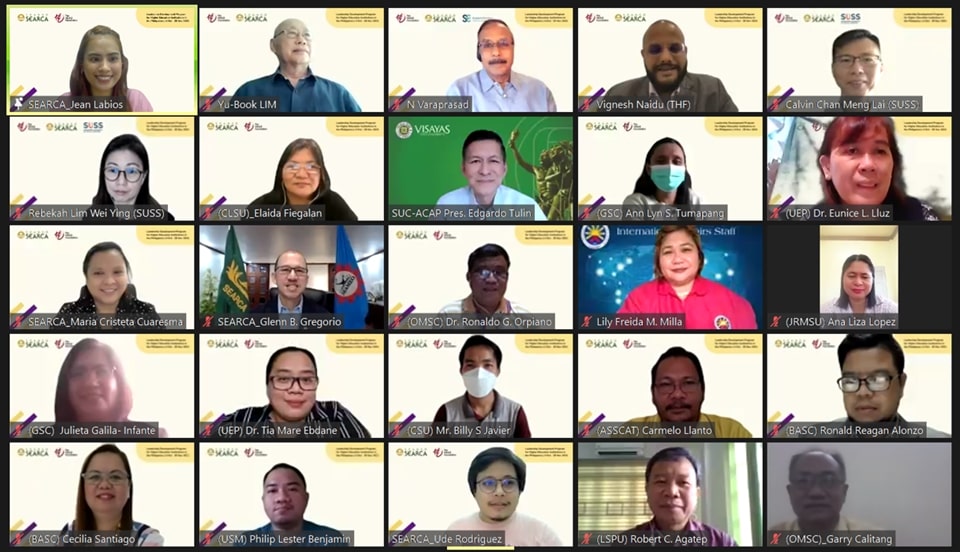 SEARCA, THF, and HEI leaders during the opening of the 2nd LDP HEIs in the Philippines.
SEARCA, THF, and HEI leaders during the opening of the 2nd LDP HEIs in the Philippines.
The program is designed under efforts to build the capacity of Southeast Asian HEI leaders to be equipped with the relevant skills and knowledge needed to effectively lead thriving and resilient universities in the region. In line with SEARCA’s 11th Five-Year Plan, the program is intended to promote HEIs’ leadership and management capacities within the context of global challenges asserted by the UN Sustainable Development Goals. As such, better outcomes are needed with respect to stronger academe-industry-government (AIG) connectivity and curricular innovations.
The program has conducted four successful runs: two regional offerings on January 2019 and January 2020, and this year, 2021, two runs catering to Philippine HEIs who are members of the State Universities and Colleges – Association of Colleges of Agriculture in the Philippines, Inc. (SUC ACAP) were implemented. The first for 2021 was from April until June with 29 participants from 11 HEIs, and the next was this particular run from October to November with 33 participants hailing from 17 HEIs across the Philippines. To date, the program now has enhanced the capacities of 98 higher education leaders in the region.
The program consisted of four modules, arranged to challenge participants to “Up Your Game!” with respect to four key areas: leadership, graduate preparedness, technology, and faculty readiness. Each requires development of new visions, strategies, goals, and policies for leaders to take to their faculty and other staff and re-orient them to higher levels of outcomes.
This 2nd LDP HEIs in the Philippines falls under SEARCA’s project with the Philippine Commission on Higher Education (CHED) titled “Leveling-Up Philippine Higher Education Institutions in Agriculture, Fisheries, and Natural Resources (LevelUPHEI AFAR)” which aims to upgrade the institutional capacities of the State Universities and Colleges – Association of Colleges of Agriculture in the Philippines, Inc. (SUC-ACAP, Inc.) and its 75 members through Short-term Training Programs and Cross-visits, and participation in University Consortium activities. All events and activities under this project are by invitation only for SUC-ACAP member institutions.
On 13 October, the program officially opened with welcome messages from Atty. Lily Freida Milla, Director III of International Affairs Staff under the Commission on Higher Education (CHED); Dr. Edgardo Tulin, President of SUC ACAP; Dr. Glenn Gregorio, Director of SEARCA; and Mr. Lim Yu Book, Board Member and Acting CEO of The HEAD Foundation.
“It is my greatest hope that the partnership will be fruitful in addressing the needs of the higher education sector, not only during the pandemic, but likewise in advancing the quality of higher education in the country as an anchor to a future-proof, resilient and productive higher education sector in the years to come,” said Atty. Milla.
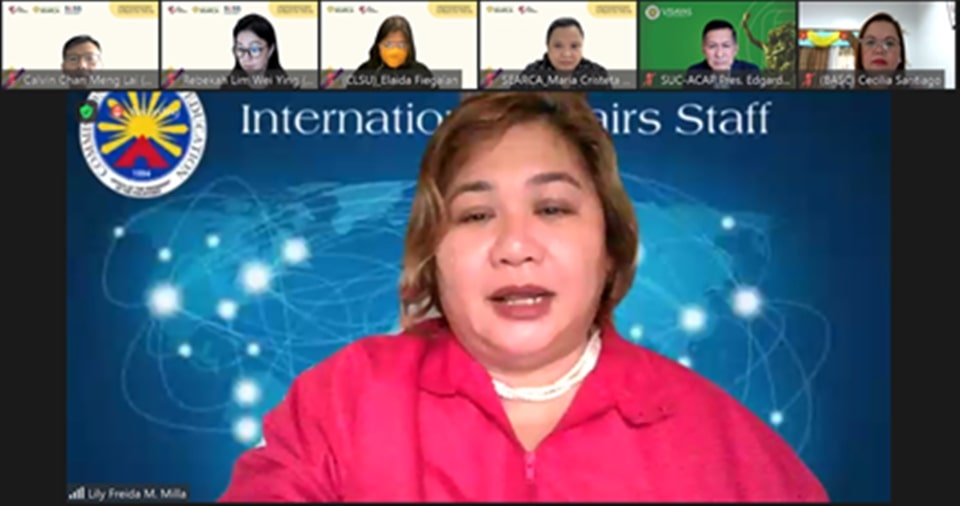 Atty. Milla delivering the welcome message on behalf of CHED.
Atty. Milla delivering the welcome message on behalf of CHED.
Under the first module of the program, Dr. Gregorio delivered a keynote address titled “The Changing Role of Universities in the Philippines: Prospects and Challenges.” He highlighted how the quality of the country’s workforce is dependent on the quality of education provided. He acknowledged that its achievement is met with many challenges such as inequitable access to education, shift to digital technology, financial limitations, ensuring quality assurance, and most recently, the COVID-19 pandemic, among others.
“We need to have an ‘ASEAN-ready Agriculture Education.’ It entails competency-based, partnership-driven and infrastructure-based, multi-track and specialization, industry co-designed and co-owned, employment and enterprise-ready, and all-in ASEAN community perspective curriculum”, said Dr. Gregorio.
 Dr. Gregorio and Dr. Prasad (left and right) during Session 1 of the program.
Dr. Gregorio and Dr. Prasad (left and right) during Session 1 of the program.
To develop appreciation of Dr. Gregorio’s keynote address, Dr. Natarajan Varaprasad, LDP HEIs Program Director, facilitated a discussion on the challenges and opportunities facing the participants’ respective HEIs.
Dr. Fay Lea Patria Lauraya, University of Nueva Caceres President, discussed “Ethics and Governance in Leadership.” She cited and reviewed some leadership philosophies which can be applied in the participants’ respective HEIs. “Who you are shapes how you lead. Your personal value doesn’t differ from your value as being a leader. It is a continuum. Who you are as a person, you bring your values to the work place as your leadership values,” Dr. Lauraya stated.
 Dr. Lauraya and Dr. Chan (left and right) during Session 2 of the program.
Dr. Lauraya and Dr. Chan (left and right) during Session 2 of the program.
Dr. Calvin Chan, Director of the Office of Graduate Studies of the Singapore University of Social Sciences (SUSS) discussed “Driving Excellence in Academia,” covering what quality and excellence mean in the context of Philippine higher education.
Under the second module on future-ready graduates, Ms. Cathlea Barote, Chief People Officer of East-West Seed International Ltd. In Thailand, delivered a keynote address tackling “The Changing World of Work and its Implications on Graduate Preparedness.” She provided a discussion on the expectations of employers on the knowledge and skills of agriculture graduates and how such graduates need to be multi-skilled with a balance between domain knowledge and life skills.
 Ms. Barote delivering the keynote address for Module 2.
Ms. Barote delivering the keynote address for Module 2.
Under this module, Dr. Chan also discussed the “Impact of Changing World of Work on University Curriculum,” where technology’s impact on agriculture and graduate competencies were explained. Design thinking ideas on how to listen to the needs of industry and balance student experiences were also presented.
This led to the discourse of the third module where Dr. Chan discussed several simple tools for remote learning. Dr. Rebekah Lim, Director of the Teaching and Learning Center of SUSS, provided a lecture on the impact of technology on students.
Prof. Lim Cher Ping from the Education University of Hong Kong joined the program by delivering a keynote presentation on the transition from “From University to Multiversity: How Technology is changing Higher Education.” Prof. Lim addressed the rapid changes in technology that have revolutionized teaching and learning, access, resource sharing and opened a world of new possibilities.
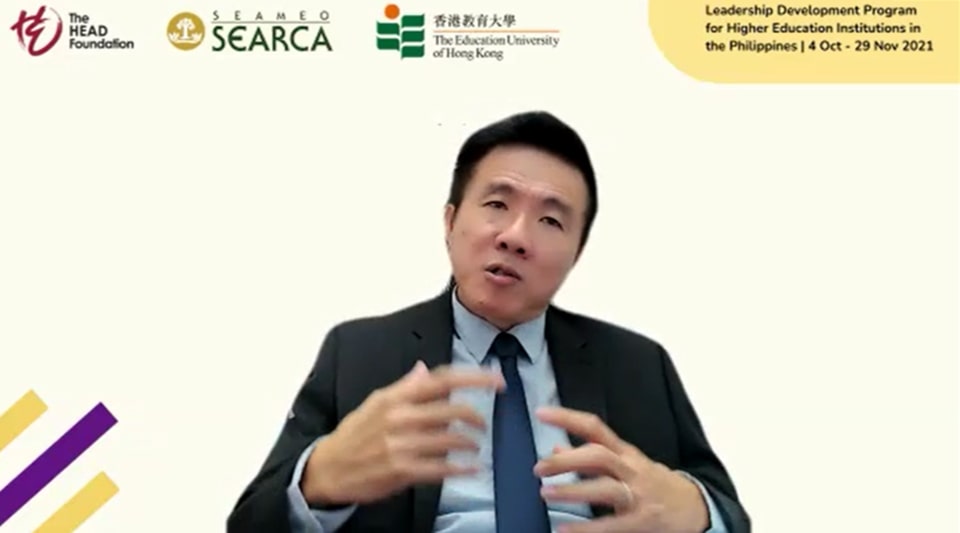 Prof. Lim delivering the keynote address for Module 3.
Prof. Lim delivering the keynote address for Module 3.
Together with Dr. Varaprasad, a discussion with the participants was facilitated by asking the questions, “Is my university ready and capable of meeting the challenges of this tech revolution? What will it take to raise the game?”
Under the fourth module, the program featured Prof. Hyo-Jeong So, Chair of the Department of Educational Technology of EWHA Womans University in South Korea. She discussed “Expanding the Toolkit of University Faculty,” and presented different instruments that are now available to all faculty for teaching, learning, and assessments, apart from the usual use of PowerPoint presentations, examinations, and quizzes.
 Prof. So and Dr. Lim (left and right) during Session 7 of the program.
Prof. So and Dr. Lim (left and right) during Session 7 of the program.
This was followed by a discussion with Dr. Lim on “Preparing Faculty to be Ready for the Tech Revolution.” Dr. Lim presented faculty professional development for the new normal, building on their pedagogical knowledge, research skills and desire to learn; and how much unlearning must take place.
Module 4 was closed with a keynote address from the University of the Philippines (UP) President, Atty. Danilo Concepcion. He shared his insights on institutional resilience in the aftermath of the COVID-19 pandemic and how universities should prepare for future disruptions, especially with respect to teaching faculty. He provided examples on how UP adapted when the pandemic hit.
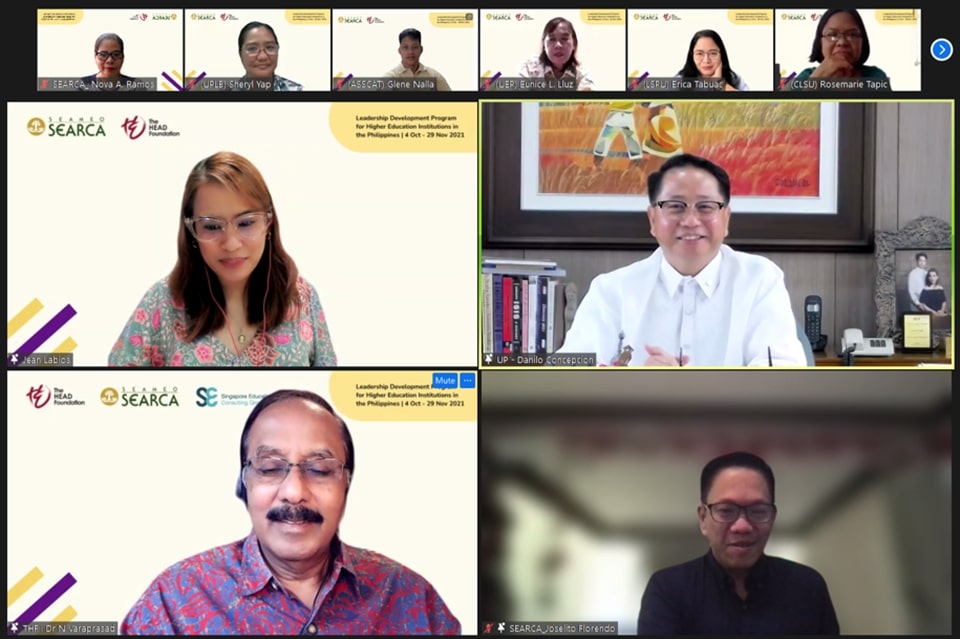 Photo featuring the discussion with UP President Danilo Concepcion.Top L-R: Ms. Jean Labios, ECLD-T4DU Program Specialist, and UP President Concepcion. Bottom L-R: Dr. Varaprasad, and Prof. Joselito Florendo, SEARCA Deputy Director for Administration.
Photo featuring the discussion with UP President Danilo Concepcion.Top L-R: Ms. Jean Labios, ECLD-T4DU Program Specialist, and UP President Concepcion. Bottom L-R: Dr. Varaprasad, and Prof. Joselito Florendo, SEARCA Deputy Director for Administration.
The last two days of the program focused on the participants’ development of their respective Re-entry Action Plans (REAPs). They also presented these to the program’s faculty, who provided insights on how they could improve their targets.
On 29 November, three alumni from the program’s regional offerings shared their thoughts and perspectives on how LDP HEIs has influenced the way they perform their work as leaders in their respective institutions. They also shared the issues they have encountered in executing and implementing their REAPs. The three alumni include Dr. Mary Jocelyn Battung, President, JH Cerilles State College System, Zamboanga del Sur, Philippines; Ms. Leng Soknaram, Chief of Planning and International Relations Office, Prek Leap National College of Agriculture, Cambodia; and Dr. Adeliza Dorado, Associate Dean for Instruction, Office of the Dean, and Associate Professor, Institute of Food Science and Technology, College of Agriculture and Food Sciences, University of the Philippines Los Baños.
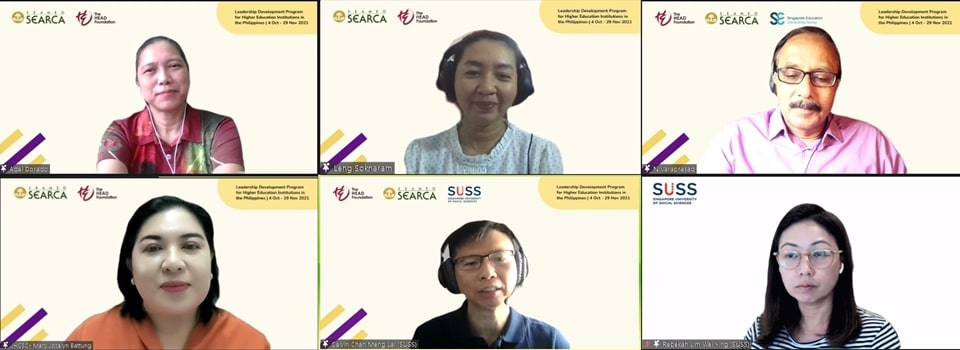 Photo featuring the Supplementary Session on 29 November with the program alumni and faculty. Top L-R: Dr. Adeliza Dorado, Ms. Leng Soknaram, and Dr. Varaprasad. Bottom L-R: Dr. Mary Jocelyn Battung, Dr. Chan, and Dr. Lim.
Photo featuring the Supplementary Session on 29 November with the program alumni and faculty. Top L-R: Dr. Adeliza Dorado, Ms. Leng Soknaram, and Dr. Varaprasad. Bottom L-R: Dr. Mary Jocelyn Battung, Dr. Chan, and Dr. Lim.
Post-workshop Coaching Sessions are slated in January 2022 where the 17 participating HEIs will be given the chance to discuss with the faculty how to refine as well as tackle implementation issues of their respective REAPs.
This 2nd LDP HEIs in the Philippines was led by Dr. Natarajan Varapasad as its Program Director, along with SUSS Directors, Dr. Rebekah Lim and Dr. Calvin Chan. With The HEAD Foundation, SEARCA’s Training for Development Unit (T4DU) under the Education and Collective Learning Department (ECLD), and Management Information Systems Unit (MISU) provided the support for the program.